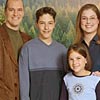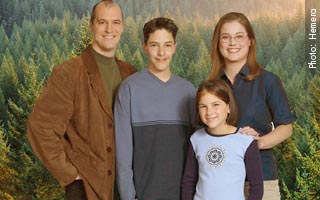 This holiday season take a journey of adventure and discovery and prepare to write your family history. Your mission, if you decide to accept it, will be to interview your family members and learn what makes you who you are today.
This holiday season take a journey of adventure and discovery and prepare to write your family history. Your mission, if you decide to accept it, will be to interview your family members and learn what makes you who you are today.
Visit websites and chronicles of ancient documents to discover who landed where and who married who, and who in your family made the news.
Boldly go where few relatives have gone before and carefully review those old letters and pictures that have been in the attic for years. As you converse around the Thanksgiving meal, discover who made that delicious recipe for turkey stuffing or some other dish that is ritually prepared every holiday season. Speak in honor of those who served our country in a foreign war. Find out the accomplishments of your forefathers and record them for history. Visit a gravesite and experience the sacred resting-place of an ancestor.
Be aware of the reasons of why you want to write your family history, as they will tell you something about yourself.
Why do you have a particular interest in something? Maybe there is an internal need to write your family history. Author Marcia D. Yannizze Melnyk of “Family History 101; A Beginners Guide To Finding Your Ancestors” says that she believes that ancestors pick us to write the family story for the family descendants.
Discover new mysteries
Author of Family History Made Easy’ Loretto Dennis Szucs said, “Family history research combines elements of a great detective mystery and a enormous jigsaw puzzle. You’ll experience the thrill of finding a particular elusive individual- then satisfaction as you add his or her name to your family’s story.”
Love your ancestors
Author of “Psychic Roots; Serendipity & Intuition in Genealogy” Henry Z Hank Jones, Jr. wrote about his book “Psychic Roots shows how feeling about one’s ancestors, as well as thinking about them, usually results in a more successful search.” In his book you will find stories of dozens of genealogists, who have had similarly intimate experiences with ancestors long since departed.
 Be accurate in your writing. Michael Boonstra said, “As a professional genealogist, I like to remind people that one of the most important things to include in a family history is proper documentation. In my field, a family history with no cited sources is often considered to be a work of fiction. Even if you are using such things as oral histories for sources, the person’s name, date of the interview and other pertinent information should be cited. If you want all your hard work to be taken seriously, you must cite your sources.”
Be accurate in your writing. Michael Boonstra said, “As a professional genealogist, I like to remind people that one of the most important things to include in a family history is proper documentation. In my field, a family history with no cited sources is often considered to be a work of fiction. Even if you are using such things as oral histories for sources, the person’s name, date of the interview and other pertinent information should be cited. If you want all your hard work to be taken seriously, you must cite your sources.”
Again be accurate, “The importance of documenting our sources cannot be over emphasized.
We must cite where we found our information whether it is from an oral history interview with Aunt Marie or a roll of microfilm from the National Archives. Citations must include enough information so that someone else can find the source. That means author, title, publisher, date, roll number, page number, library call number, everything about our sources. It is also important to seek out the best possible source and to compare and analyze sources to get as close as possible to the actual facts. Just because something is written down does not make it true,†said Vera Zimmerman.Education Chairman of Brevard Genealogical Society.
Get your family involved
Blondie Clayton relates that, “Getting the family involved can start with organizing teams to carry out tasks such as typing, proofreading, scanning photos, editing, research, collecting and labeling documents, iterviewing family members, filing, assembling and tagging photos, printing cost, creating covers, filing copyright, etc., depending on how far one wants to take their family history project.”
Most of all have fun
Michael Boonstra said, “Family Histories are also changing and becoming more well rounded, so to speak. Some authors are including things like old family recipes similar to those found in the cookbook recently printed by the Brevard County Library System called “Food Facts and Fiction.”
Other authors are including some high tech sleuthing such as the results from DNA studies such as National Geographic’s Genographic project, which is mapping human migration across the globe over the last 60,000 years.
Join us October 1st at Cocoa Library on Forrest Ave from 10:AM to Noon for a panel discussion on Writing Family Histories.
First speaker is Blondie Clayton, who tells us, “My goal as a publishing coach and work shop facilitator is to stimulate the imagination, motivate and move participants. To not only go beyond “thinking” of writing a family history, but to take action using the tips and suggestions provided to start and finish, whether they choose personal history writing or a biography of an ancestor.”
Our second speaker is Michael Boonstra, Genealogist at the library who will share techniques of discovering who your ancestors were. Note: This message will NOT self-destruct in 30 seconds, as it will last for eternity.
For updates, contact Ray by sending an email to guru153@yahoo.com
RSVP appreciated but not necessary.